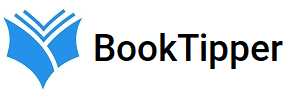
RAGE
by Bob Woodward
Bob Woodward’s new book, Rage, is an unprecedented and intimate tour de force of new reporting on the Trump presidency facing a global pandemic, economic disaster and racial unrest.
Woodward, the #1 international bestselling author of Fear: Trump in the White House, has uncovered the precise moment the president was warned that the Covid-19 epidemic would be the biggest national security threat to his presidency. In dramatic detail, Woodward takes readers into the Oval Office as Trump’s head pops up when he is told in January 2020 that the pandemic could reach the scale of the 1918 Spanish Flu that killed 675,000 Americans.
In 17 on-the-record interviews with Woodward over seven volatile months—an utterly vivid window into Trump’s mind—the president provides a self-portrait that is part denial and part combative interchange mixed with surprising moments of doubt as he glimpses the perils in the presidency and what he calls the “dynamite behind every door.”
At key decision points, Rage shows how Trump’s responses to the crises of 2020 were rooted in the instincts, habits and style he developed during his first three years as president.
Revisiting the earliest days of the Trump presidency, Rage reveals how Secretary of Defense James Mattis, Secretary of State Rex Tillerson and Director of National Intelligence Dan Coats struggled to keep the country safe as the president dismantled any semblance of collegial national security decision making.
Rage draws from hundreds of hours of interviews with firsthand witnesses as well as participants’ notes, emails, diaries, calendars and confidential documents.
Woodward obtained 25 never-seen personal letters exchanged between Trump and North Korean leader Kim Jong Un, who describes the bond between the two leaders as out of a “fantasy film.”
Trump insists to Woodward he will triumph over Covid-19 and the economic calamity. “Don’t worry about it, Bob. Okay?” Trump told the author in July. “Don’t worry about it. We’ll get to do another book. You’ll find I was right.”
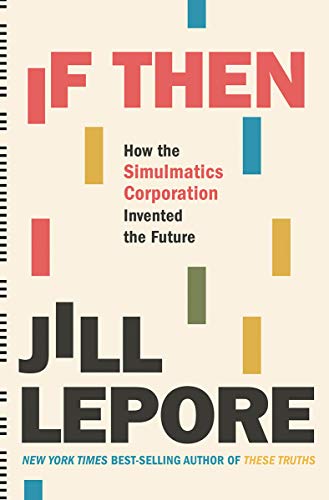
IF THEN
by Jill Lepore
Longlisted • Financial Times & McKinsey Business Book of the Year
A revelatory account of the Cold War origins of the data-mad, algorithmic twenty-first century, from the author of the acclaimed international bestseller These Truths.
The Simulmatics Corporation, launched during the Cold War, mined data, targeted voters, manipulated consumers, destabilized politics, and disordered knowledge―decades before Facebook, Google, and Cambridge Analytica. Jill Lepore, best-selling author of These Truths, came across the company’s papers in MIT’s archives and set out to tell this forgotten history, the long-lost backstory to the methods, and the arrogance, of Silicon Valley.
Founded in 1959 by some of the nation’s leading social scientists―“the best and the brightest, fatally brilliant, Icaruses with wings of feathers and wax, flying to the sun”―Simulmatics proposed to predict and manipulate the future by way of the computer simulation of human behavior. In summers, with their wives and children in tow, the company’s scientists met on the beach in Long Island under a geodesic, honeycombed dome, where they built a “People Machine” that aimed to model everything from buying a dishwasher to counterinsurgency to casting a vote. Deploying their “People Machine” from New York, Washington, Cambridge, and even Saigon, Simulmatics’ clients included the John F. Kennedy presidential campaign, the New York Times, the Department of Defense, and dozens of major manufacturers: Simulmatics had a hand in everything from political races to the Vietnam War to the Johnson administration’s ill-fated attempt to predict race riots. The company’s collapse was almost as rapid as its ascent, a collapse that involved failed marriages, a suspicious death, and bankruptcy. Exposed for false claims, and even accused of war crimes, it closed its doors in 1970 and all but vanished. Until Lepore came across the records of its remains.
The scientists of Simulmatics believed they had invented “the A-bomb of the social sciences.” They did not predict that it would take decades to detonate, like a long-buried grenade. But, in the early years of the twenty-first century, that bomb did detonate, creating a world in which corporations collect data and model behavior and target messages about the most ordinary of decisions, leaving people all over the world, long before the global pandemic, crushed by feelings of helplessness. This history has a past; If Then is its cautionary tale.
20 black-and-white illustrations
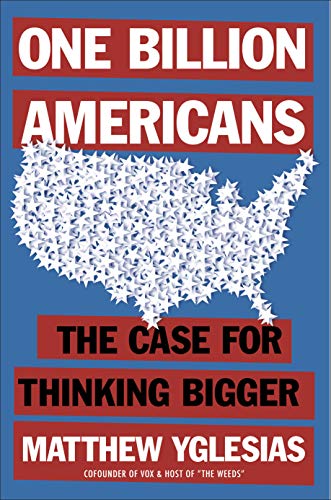
ONE BILLIONS AMERICANS
by Matthew Yglesias
What would actually make America great: more people.
If the most challenging crisis in living memory has shown us anything, it’s that America has lost the will and the means to lead. We can’t compete with the huge population clusters of the global marketplace by keeping our population static or letting it diminish, or with our crumbling transit and unaffordable housing. The winner in the future world is going to have more—more ideas, more ambition, more utilization of resources, more people.
Exactly how many Americans do we need to win? According to Matthew Yglesias, one billion.
From one of our foremost policy writers, One Billion Americans is the provocative yet logical argument that if we aren’t moving forward, we’re losing. Vox founder Yglesias invites us to think bigger, while taking the problems of decline seriously. What really contributes to national prosperity should not be controversial: supporting parents and children, welcoming immigrants and their contributions, and exploring creative policies that support growth—like more housing, better transportation, improved education, revitalized welfare, and climate change mitigation. Drawing on examples and solutions from around the world, Yglesias shows not only that we can do this, but why we must.
Making the case for massive population growth with analytic rigor and imagination, One Billion Americans issues a radical but undeniable challenge: Why not do it all, and stay on top forever?
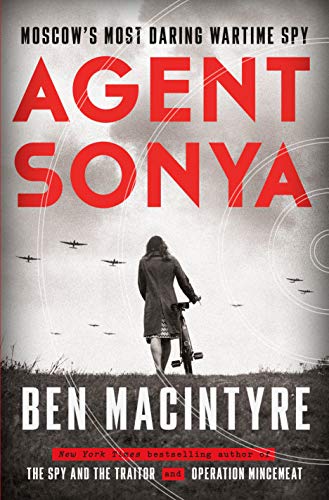
AGENT SONYA
by Ben Macintyre
The “master storyteller” (San Francisco Chronicle) behind the New York Times bestseller The Spy and the Traitor uncovers the true story behind the Cold War’s most intrepid female spy.
In 1942, in a quiet village in the leafy English Cotswolds, a thin, elegant woman lived in a small cottage with her three children and her husband, who worked as a machinist nearby. Ursula Burton was friendly but reserved, and spoke English with a slight foreign accent. By all accounts, she seemed to be living a simple, unassuming life. Her neighbors in the village knew little about her.
They didn’t know that she was a high-ranking Soviet intelligence officer. They didn’t know that her husband was also a spy, or that she was running powerful agents across Europe. Behind the facade of her picturesque life, Burton was a dedicated Communist, a Soviet colonel, and a veteran agent, gathering the scientific secrets that would enable the Soviet Union to build the bomb.
This true-life spy story is a masterpiece about the woman code-named “Sonya.” Over the course of her career, she was hunted by the Chinese, the Japanese, the Nazis, MI5, MI6, and the FBI—and she evaded them all. Her story reflects the great ideological clash of the twentieth century—between Communism, Fascism, and Western democracy—and casts new light on the spy battles and shifting allegiances of our own times.
With unparalleled access to Sonya’s diaries and correspondence and never-before-seen information on her clandestine activities, Ben Macintyre has conjured a page-turning history of a legendary secret agent, a woman who influenced the course of the Cold War and helped plunge the world into a decades-long standoff between nuclear superpowers
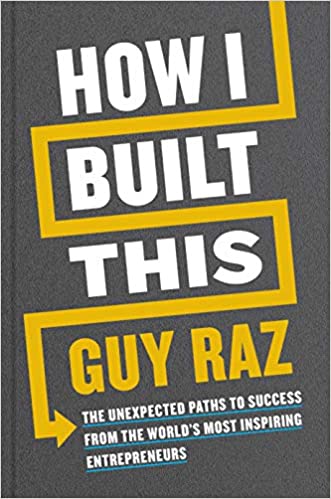
HOW I BUILT THIS
by Guy Raz
Based on the highly acclaimed NPR podcast, How I Built This with Guy Raz, this book offers priceless insights and inspiration from the world’s top entrepreneurs on how to start, launch, and build a successful venture.
Great ideas often come from a simple spark: A soccer player on the New Zealand national team notices all the unused wool his country produces and figures out a way to turn them into shoes (Allbirds). A former Buddhist monk decides the very best way to spread his mindfulness teachings is by launching an app (Headspace). A sandwich cart vendor finds a way to reuse leftover pita bread and turns it into a multimillion-dollar business (Stacy’s Pita Chips).
Award-winning journalist and NPR host Guy Raz has interviewed more than 200 highly successful entrepreneurs to uncover amazing true stories like these. In How I Built This, he shares tips for every entrepreneur’s journey: from the early days of formulating your idea, to raising money and recruiting employees, to fending off competitors, to finally paying yourself a real salary. This is a must-read for anyone who has ever dreamed of starting their own business or wondered how trailblazing entrepreneurs made their own dreams a reality.

THE SPY MASTERS: HOW CIA DIRETORS SHAPE HISTORY AND THE FUTURE
by Chris Whipple
From the New York Times bestselling author of The Gatekeepers, a remarkable, behind-the-scenes look at what it’s like to run the world’s most powerful intelligence agency, and how the CIA is often a crucial counterforce against presidents threatening to overstep the powers of their office.
Only eleven men and one woman are alive today who have made the life-and-death decisions that come with running the world’s most powerful and influential intelligence service. With unprecedented, deep access to nearly all these individuals plus several of their predecessors, Chris Whipple tells the story of an agency that answers to the United States president alone, but whose activities—spying, espionage, and covert action—take place on every continent. At pivotal moments, the CIA acts as a brake on rogue presidents, starting in the mid-seventies with DCI Richard Helms’s refusal to conceal Richard Nixon’s criminality and continuing to the present as the actions of a CIA whistleblower have ignited impeachment proceedings against Donald Trump.
Since its inception in 1947, the Central Intelligence Agency has been a powerful player on the world stage, operating largely in the shadows to protect American interests. For The Spymasters, Whipple conducted extensive, exclusive interviews with nearly every living CIA director, pulling back the curtain on the world’s elite spy agencies and showing how the CIA partners—or clashes—with counterparts in Britain, France, Germany, Israel, Jordan, Saudi Arabia, and Russia. Topics covered in the book include attempts by presidents to use the agency for their own ends; simmering problems in the Middle East and Asia; rogue nuclear threats; and cyberwarfare.
A revelatory, behind-the-scenes look, The Spymasters recounts seven decades of CIA activity and elicits predictions about the issues–and threats—that will engage the attention of future operatives and analysts. Including eye-opening interviews with George Tenet, John Brennan, Leon Panetta, and David Petraeus, as well as those who’ve just recently departed the agency, this is a timely, essential, and important contribution to current events.

THE NEW MAP
by Daniel Yergin
Pulitzer Prize-winning author and global energy expert, Daniel Yergin offers a revelatory new account of how energy revolutions, climate battles, and geopolitics are mapping our future
The world is being shaken by the collision of energy, climate change, and the clashing power of nations in a time of global crisis. The “shale revolution” in oil and gas–made possible by fracking technology, but not without controversy–has transformed the American economy, ending the “era of shortage”, but introducing a turbulent new era. Almost overnight, the United States has become the world’s number one energy powerhouse–and, during the coronavirus crisis, brokered a tense truce between Russia and Saudi Arabia. Yet concern about energy’s role in climate change is challenging our economy and way of life, accelerating a second energy revolution in the search for a low carbon future. All of this has been made starker and urgent by the coronavirus pandemic and the economic Dark Age that it has wrought.
The chessboard of world politics has been upended. A new cold war is emerging with China; and rivalries grow more dangerous with Russia, which is pivoting east toward Beijing. Vladimir Putin and China’s Xi Jinping are converging both on energy and on challenging American leadership, as China projects its power and influence in all directions. The South China Sea, claimed by China and the world’s most critical trade route, could become the arena where the United States and China collide directly. The map of the Middle East, which was laid down after World War I, is being challenged by jihadists, revolutionary Iran, ethnic and religious clashes, and restive populations. But the region has also been shocked by the two recent oil price collapses–one from the rise of shale, the other the coronavirus–and by the very question of oil’s future in the rest of this century.
A master storyteller and global energy expert, Daniel Yergin takes the reader on an utterly riveting and timely journey across the world’s “new map”. He illuminates the great energy and geopolitical questions on the eve of the historic 2020 Presidential election and the profound challenges that lie ahead.
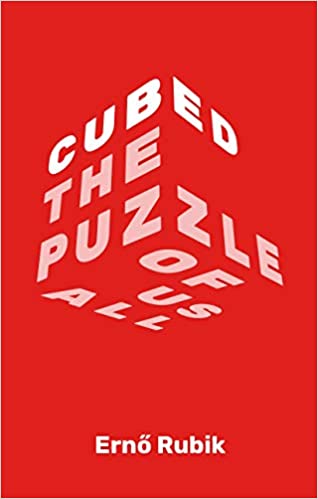
CUBED: THE PUZZLE OF US ALL
by Erno Rubik
The first book by the reclusive inventor of the world’s most iconic puzzle THE RUBIK’S CUBE. Erno Rubik inspires us with what he’s learned in a lifetime of creating, curiosity, and discovery.
Erno Rubik was a child when he first became obsessed with puzzles of all kinds. “Puzzles,” he writes, “bring out important qualities in each of us: concentration, curiosity, a sense of play, the eagerness to discover a solution.” To Rubik puzzles aren’t just games―they’re creativity machines. He encourages us to embrace our inner curiosity and find the puzzles that surround us in our everyday lives. “If you are determined, you will solve them,” he writes. Rubik’s own puzzle, the Cube, went on to be solved by millions worldwide for over forty years, become one of the bestselling toys of all time, and to be featured as a global symbol of intelligence and ingenuity.
In Cubed, Rubik covers more than just his journey to inventing his eponymous cube. He makes a case for always being an amateur―something he has always considered himself to be. He discusses the inevitability of problems during any act of invention. He reveals what it was like to experience the astonishing worldwide success of an object he made purely for his own play. And he offers what he thinks it means to be a true creator (hint: anyone can do it). Steeped in the wisdom and also the humility of a born inventor, Cubed offers a unique look at the imperfect science of creation.
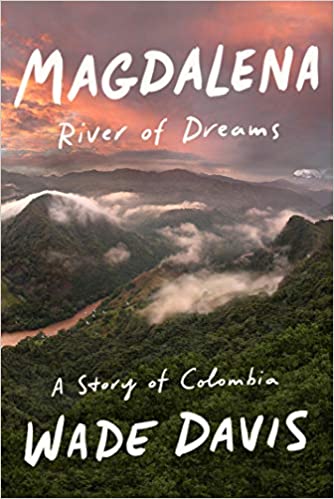
MAGDALENA: RIVER OF DREAMS
by Wade Davis
A captivating new book from Wade Davis–award-winning, best-selling author and National Geographic Explorer-in-Residence for more than a decade–that brings vividly to life the story of the great Río Magdalena, illuminating Colombia’s complex past, present, and future
Travelers often become enchanted with the first country that captures their hearts and gives them license to be free. For Wade Davis, it was Colombia. Now in a masterly new book, Davis tells of his travels on the mighty Magdalena, the river that made possible the nation. Along the way, he finds a people who have overcome years of conflict precisely because of their character, informed by an enduring spirit of place, and a deep love of a land that is home to the greatest ecological and geographical diversity on the planet. Only in Colombia can a traveler wash ashore in a coastal desert, follow waterways through wetlands as wide as the sky, ascend narrow tracks through dense tropical forests, and reach verdant Andean valleys rising to soaring ice-clad summits. This rugged and impossible geography finds its perfect coefficient in the topography of the Colombian spirit: restive, potent, at times placid and calm, in moments explosive and wild.
Both a corridor of commerce and a fountain of culture, the wellspring of Colombian music, literature, poetry, and prayer, the Magdalena has served in dark times as the graveyard of the nation. And yet, always, it returns as a river of life.
At once an absorbing adventure and an inspiring tale of hope and redemption, Magdalena gives us a rare, kaleidoscopic picture of a nation on the verge of a new period of peace. Braiding together memoir, history, and journalism, Wade Davis tells the story of the country’s most magnificent river, and in doing so, tells the epic story of Colombia.
